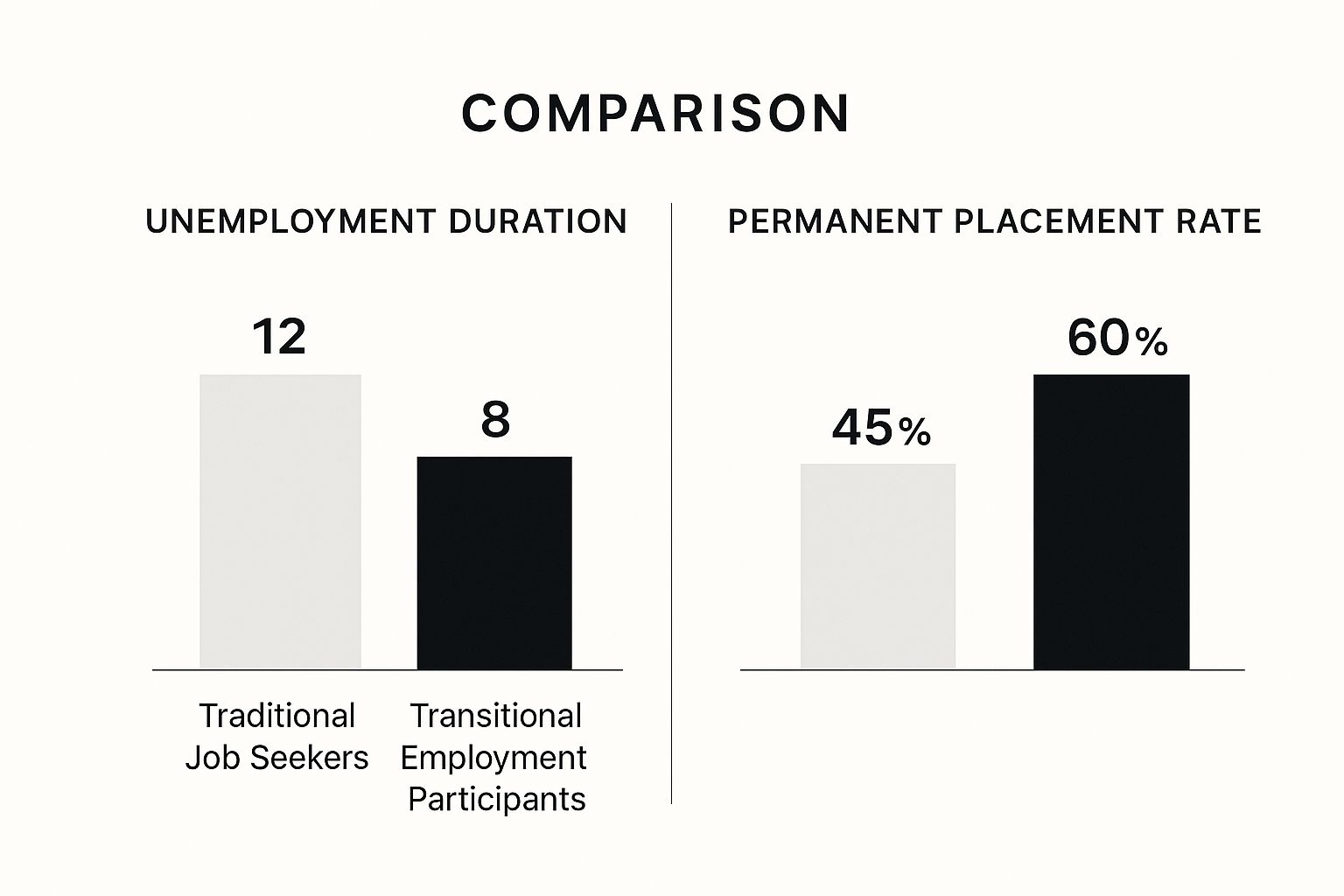Transitional Employment Indiana: Your Complete Success Guide
Understanding What Transitional Employment Really Means In Indiana
Transitional employment in Indiana presents a different way to approach the job search. It acts as a bridge, connecting unemployment to a stable career path. Unlike typical temporary jobs, the focus here is on building skills and advancing your career. This is particularly important in Indiana’s varied economy, where opportunities differ across regions and industries. Programs often collaborate with local organizations and WorkOne centers to connect Hoosiers with meaningful employment, especially during career changes, job loss, or significant life transitions.
How Transitional Employment Works in Indiana
Transitional employment isn’t just about placing people in temporary positions. It involves a combined effort between state agencies, WorkOne centers, and community groups. These groups work together to provide complete support, including skills training, resume writing, and interview practice. Transitional employment programs also frequently offer job coaching and mentoring to help people succeed in their new jobs. This supportive atmosphere sets transitional employment apart from typical temp agencies, which usually focus on filling immediate staffing needs.
The following infographic illustrates the positive impact of these programs on unemployment duration and placement rates:

As shown, participants in transitional employment programs experience shorter unemployment periods (8 weeks) compared to others (12 weeks). They also achieve better permanent placement rates (60% versus 45%). This highlights how effective these programs are in helping people find long-term jobs. This success is partially because of Indiana’s generally strong job market, creating a good base for these initiatives. Like many states, Indiana often uses transitional employment to help its workforce. In 2022, Indiana’s unemployment rate was around 2.5%, showing a stable job market that can support these programs. For more information and detailed statistics, visit the Bureau of Labor Statistics.
Benefits of Transitional Employment Programs
Several key features make these programs appealing to Indiana workers:
- Skill Enhancement: Programs provide chances to learn new skills or improve existing ones, increasing marketability.
- Networking Opportunities: Participants make professional contacts through their placements, potentially leading to other opportunities.
- Income Stability: People receive a regular paycheck while looking for permanent jobs, reducing financial pressure.
- Career Exploration: Transitional employment lets individuals explore various industries and roles, helping them find the right career path.
To understand the range of available programs, let’s examine a comparison of different types:
To help you understand the variety of programs offered, we’ve put together this table:
Types of Transitional Employment Programs in Indiana
| Program Type | Duration | Target Population | Support Services |
|---|---|---|---|
| On-the-Job Training (OJT) | Varies, typically 3-6 months | Individuals receiving unemployment benefits | Wage reimbursement to employers, job coaching, and mentorship |
| Supported Employment | Long-term, ongoing support | Individuals with disabilities | Job placement assistance, ongoing job coaching, and support services |
| Community-Based Work Experience Program (CWEP) | Temporary, up to 30 hours per week | Individuals receiving Temporary Assistance for Needy Families (TANF) | Unpaid work experience in public or non-profit organizations, job search assistance |
| Workforce Innovation and Opportunity Act (WIOA) | Varies depending on individual needs | Adults, dislocated workers, and youth | Occupational skills training, job search assistance, and supportive services |
This table summarizes the key characteristics of each program, including their duration, intended audience, and the types of support provided. As you can see, Indiana offers a diverse range of transitional employment options to meet the unique needs of its workforce.
These programs are becoming increasingly valuable for Hoosiers looking to grow their careers, shift industries, or overcome barriers to employment. This comprehensive approach not only addresses immediate employment needs but also helps individuals achieve lasting career success.
Why Smart Indiana Workers Choose Transitional Employment

Transitional employment offers Indiana workers significant advantages that go beyond just a paycheck. These programs act as a crucial bridge, especially helpful in the current employment landscape. Many Hoosiers are taking advantage of these programs to propel their careers forward throughout the state.
This is largely because transitional employment programs emphasize crucial skill development, often lacking in a traditional job search.
Skill Building and Networking: Two Key Advantages
One of the primary benefits is the ability to learn new skills or enhance existing ones. This focused skill development occurs within a practical, real-world environment, making participants more desirable candidates for permanent roles.
In addition, transitional employment encourages professional networking. Participants develop connections that can lead to future opportunities, establishing a supportive community for career growth. This means that while earning a steady income, you’re also investing in your long-term career success. Learn more in our article about the best companies to work for in Indiana.
Stability and Exploration in a Changing Job Market
Transitional employment also provides valuable income stability during the often-uncertain period of career change. This stability can reduce financial anxieties and allow individuals to carefully consider career options, instead of accepting the first available position.
Further, these programs offer a unique opportunity to explore different industries and roles. This experimentation can be extremely beneficial for those considering a career shift or exploring new interests, giving them a chance to “try before they buy.” The idea of transitional employment is closely related to broader workforce mobility. The U.S. Census Bureau’s Longitudinal Employer-Household Dynamics (LEHD) data offers valuable insights into these job-to-job flows across the country. Find more detailed statistics here.
Real-World Success Stories Across Indiana
Throughout Indiana, from Indianapolis to smaller towns, individuals are utilizing transitional employment as a launchpad for career advancement and overcoming employment obstacles.
For instance, people in manufacturing, healthcare, and logistics have successfully used these programs to transition into new positions or industries. These real-world success stories highlight the positive impact of transitional employment, demonstrating how it can be a valuable resource for career development and adaptability in Indiana’s dynamic job market. These programs not only strengthen resumes but also boost confidence and offer a sense of direction during career transitions.
Where The Real Opportunities Are Hiding Across Indiana

While some job seekers concentrate on well-trodden career paths, resourceful Hoosiers are uncovering transitional employment gems in overlooked sectors. These are industries with programs designed to offer alternative entry points.
Indiana’s strong manufacturing base, expanding healthcare system, and booming logistics industry often feature positions ideal for those leveraging transitional programs.
Sector Spotlight: Manufacturing, Healthcare, and Logistics
These key Indiana sectors offer distinct advantages for individuals pursuing transitional employment. Manufacturing frequently provides valuable on-the-job training. The healthcare sector often has temporary staffing needs, presenting excellent opportunities for those seeking an entry point.
Indiana’s central location makes it a transportation hub, driving significant growth in logistics. This constant demand for workers creates more entry-level openings and a greater need for transitional programs.
Location, Location, Location: Opportunities Across the Hoosier State
Job opportunities vary across the state, from vibrant cities like Indianapolis and Fort Wayne to smaller towns and rural areas. Indianapolis, with its diverse economy, provides a wide array of transitional employment options.
Fort Wayne’s focus on advanced manufacturing offers more specialized career pathways. Smaller communities and agricultural regions often have seasonal work, which can serve as a springboard to permanent employment. Each region’s unique economy shapes the available transitional employment paths.
The Bureau of Economic Analysis (BEA) tracks employment data by county and metropolitan area, offering insights into industry breakdowns and job growth across Indiana. You can find more detailed statistics here.
Emerging Industries and Advancement Timelines
Beyond established industries, transitional employment can open doors to emerging sectors like tech and renewable energy. These developing fields often utilize transitional programs to train new talent.
Understanding the structure of these programs is crucial. Some sectors offer faster advancement than others. For instance, manufacturing may have a clear progression from entry-level to skilled labor. Healthcare, however, could require additional certifications for career advancement. Researching specific program timelines is key for setting realistic expectations.
Insider Insights: Setting Yourself Up for Success
By exploring these diverse opportunities, Indiana residents can strategically choose transitional employment aligned with their career aspirations. Consider the unique advantages offered by different sectors and regions.
This strategic approach allows individuals to gain experience, build professional networks, and advance their careers in Indiana’s dynamic job market. The ultimate goal is to use transitional employment as a launchpad for long-term career success.
Getting Connected: Your Roadmap To Indiana Programs

Finding the right transitional employment program in Indiana can feel overwhelming. This guide simplifies the process, helping you locate and secure positions that align with your career aspirations. We’ll explore WorkOne Centers, the function of workforce development boards, and the valuable role of community organizations. For additional job search advice, check out this helpful resource: How to master your job search.
Understanding WorkOne Centers
WorkOne Centers act as comprehensive hubs for employment services across Indiana. They offer a wide range of free assistance to all Indiana residents, including job searching, resume writing support, skills training, and career counseling.
Career advisors at WorkOne Centers can help you assess your existing skills, identify promising job opportunities, and develop a personalized job search strategy. They also provide access to computers, internet, and other essential resources.
Having a dedicated space with the necessary tools can significantly boost your job search efforts. WorkOne Centers also frequently host job fairs and workshops, providing direct connections with potential employers.
Workforce Development Boards: Connecting You With Opportunities
Workforce development boards are instrumental in linking employers with qualified candidates. They concentrate on regional economic requirements, gaining a deep understanding of the unique job markets within different parts of Indiana.
These boards collaborate with businesses to analyze current and future workforce needs, ensuring training programs are aligned with industry demands. While they don’t directly place individuals in jobs, they facilitate connections between job seekers and employers.
By funding training programs geared toward in-demand positions, workforce development boards ensure that these programs address real-world employment needs. This collaboration benefits both job seekers and employers.
Community Organizations: Targeted Support for Your Specific Needs
Many community organizations across Indiana offer specialized support for transitional employment. Some focus on specific groups, such as veterans or individuals with disabilities. Others may specialize in training for specific industries, like manufacturing or healthcare.
For instance, Goodwill Industries provides job training and placement services, while Dress for Success empowers women entering or re-entering the workforce.
Identifying the right community organization can add a vital layer of support. These organizations often possess a deep understanding of the specific obstacles faced by different groups, enabling them to offer tailored assistance.
To further illustrate the resources available, the following table provides a directory of some key organizations:
Indiana Transitional Employment Resources
| Organization | Services Offered | Coverage Area | Contact Method |
|---|---|---|---|
| Goodwill Industries | Job training, placement services | Statewide | Website, phone |
| Dress for Success | Career development, professional attire | Select cities | Website, phone |
| Indiana Department of Workforce Development | WorkOne Centers, training programs | Statewide | Website, phone |
This table highlights the variety of services and coverage areas available to those seeking transitional employment in Indiana. By exploring these options, individuals can find the resources that best meet their specific needs.
Application Preparation and Essential Documentation
Creating compelling job applications is essential for securing a transitional employment position. Emphasize relevant skills and experience, tailoring your resume and cover letter to each specific job description.
Don’t forget to highlight any volunteer work or community involvement. These activities often demonstrate valuable soft skills. Gathering necessary documentation, such as your driver’s license, Social Security card, and any relevant certifications, beforehand streamlines the application process.
Effective Case Management and Online Resources
Once enrolled in a program, active engagement with your case manager is crucial. They can offer valuable guidance, connect you with additional resources, and advocate for your success.
Regular communication is key to maximizing your transitional employment experience. Utilizing Indiana’s online job matching systems can significantly broaden your job search. These platforms connect job seekers with employers and provide access to a wider range of opportunities.
Smart Strategies That Actually Lead To Career Success
Transitional employment in Indiana offers more than just a temporary paycheck; it’s a chance to strategically invest in your future career. It requires proactive effort and a focus on building valuable relationships.
Setting Realistic Goals and Developing Marketable Skills
First, define clear, attainable career goals. Ask yourself: are you targeting a particular industry? Do you want to improve specific skills? Having a clear objective keeps you motivated and focused.
While employed, prioritize skill development. Every assignment, no matter how small, is a learning opportunity. Identify existing skills to refine and new ones to acquire. This strengthens your resume and makes you a more competitive candidate for permanent roles. For instance, in a clerical position, focus on enhancing your Microsoft Office Suite skills or improving your communication abilities. These transferable skills are valuable across various industries.
Building Professional Relationships That Open Doors
Networking is crucial. Cultivate strong relationships with supervisors, colleagues, and everyone you encounter during your transitional employment. These connections can provide valuable insights, mentorship opportunities, and even job leads. Consider attending industry events or joining relevant professional organizations to expand your network within Indiana’s business community. This demonstrates initiative and a commitment to your chosen field.
Documenting Achievements and Staying Focused During Uncertainty
Thoroughly document your accomplishments during transitional roles. Maintain a record of projects completed, skills acquired, and positive feedback received. This information becomes extremely valuable when updating your resume and interviewing for permanent positions. It provides concrete evidence of your contributions and capabilities.
Maintaining focus and motivation can be difficult during periods of uncertainty. Remember your long-term career objectives and acknowledge even small successes. Setting regular milestones, whether weekly or monthly, helps track progress and maintain momentum. For insights into Indiana’s workforce needs, consider exploring Indiana’s Skills Reports.
Managing Finances and Evaluating Opportunities
Sound financial management is paramount during times of variable income. Develop a practical budget and track expenses diligently. Research available resources for financial support if needed. This will help maintain financial stability during your transitional employment phase.
Evaluate each job opportunity thoughtfully. Does the role align with your long-term career aspirations? Will it offer opportunities to develop relevant skills or build valuable connections? Be selective and strategic in your job search, ensuring that each role contributes to your overall career goals.
Positioning Yourself for a Successful Transition
To ensure a seamless transition to permanent employment, customize your resume and cover letter to emphasize the skills and experience gained during transitional roles. Practice your interviewing techniques and be prepared to articulate how these experiences have prepared you for a permanent position. Highlight your adaptability and eagerness to learn – qualities highly valued by employers. By implementing these strategies, you can leverage transitional employment as a powerful stepping stone toward achieving your career goals in Indiana.
Solving The Problems Nobody Talks About
Transitional employment programs offer many advantages, but they also present unique challenges. This section explores the realities of transitional employment in Indiana, providing practical solutions to common obstacles. We’ll share insights from those who have navigated this path, offering guidance on managing income fluctuations, scheduling difficulties, and the emotional impact of career changes.
The Financial Rollercoaster: Managing Income Variability
One of the biggest hurdles of transitional employment is the unpredictable nature of income. Unlike a traditional salary, transitional work often involves fluctuating paychecks, which can be stressful when budgeting for household expenses. Creating a flexible budget is essential. Track your income and expenses diligently, and build an emergency fund to cushion leaner times. Resources like the Indiana 211 Partnership can offer assistance with budgeting and financial planning.
Juggling Act: Handling Irregular Schedules
Transitional roles frequently involve non-traditional or varying schedules. This can make balancing work with personal commitments, childcare, or continuing education challenging. Open communication with your employer and family is vital. Clearly discuss your schedule and its potential changes. Consider flexible childcare options and explore online learning platforms for professional development. These solutions can transform a seemingly impossible situation into a manageable one.
The Emotional Side of Transition: Dealing with Uncertainty and Stigma
Career transitions, even positive ones, can be emotionally challenging. Job security concerns and the potential stigma associated with transitional work can impact self-esteem. Remember that transitional employment is a stepping stone, not a final destination. Concentrate on skill development and networking. Connect with support groups or career counselors at your local WorkOne Center for guidance. These connections offer invaluable support and advice.
Addressing Employment Gaps and Managing Multiple Positions
Sometimes, transitional employment leads to holding multiple jobs at once. While this can boost income, it’s crucial to avoid burnout. Prioritize tasks effectively and set clear boundaries between roles. Utilize a planner or digital calendar like Google Calendar to manage multiple schedules.
When applying for permanent positions, address any employment gaps honestly. Frame your transitional experience positively, emphasizing the skills you’ve acquired and accomplishments achieved. This shows adaptability and a proactive approach. For instance, explain how managing multiple roles enhanced your time management and organizational abilities.
Maintaining Professional Development in Temporary Settings
Even in temporary roles, continued professional development is vital. Seek opportunities to expand your skills within your current position. Explore online courses, workshops, or certifications relevant to your career goals on platforms like Coursera or LinkedIn Learning. This commitment to learning showcases initiative and dedication, making you a stronger candidate.
Focusing on Long-Term Goals and Managing Immediate Needs
Balancing long-term career aspirations with immediate financial needs is a constant challenge during transitional employment. Remain focused on your ultimate career path, even when accepting roles that might not perfectly align. Each experience provides valuable skills and connections. View your transitional role as an investment in your future. This perspective helps maintain motivation and focus on the bigger picture.
By acknowledging these challenges and implementing practical solutions, you can navigate the complexities of transitional employment and successfully advance your career in Indiana. Remember, transitional employment is a tool. Use it strategically to achieve your long-term goals.
Key Takeaways
Transitional employment in Indiana offers a valuable stepping stone to a fulfilling career. By recognizing its potential and approaching it strategically, you can leverage temporary roles to propel your professional growth. This section outlines a practical roadmap for maximizing your transitional employment experience.
Translating Temporary Experiences into Permanent Opportunities
Consider transitional employment as an opportunity to “test drive” various industries and roles. This period allows you to identify your strengths, explore new career paths, and cultivate valuable skills. For instance, a temporary customer service role can showcase your communication and problem-solving abilities – skills highly transferable across many fields. Remember to document your accomplishments and quantify your contributions whenever possible. Did you boost customer satisfaction scores? Did you streamline a process? These tangible achievements demonstrate your value to prospective employers.
Maintaining Your Network and Continued Skill Development
Building relationships during transitional employment is just as crucial as developing skills. Maintain connections with supervisors, colleagues, and mentors. These connections can be invaluable sources of references and job leads. Indiana’s vibrant business community provides numerous networking opportunities. Attend industry events and join professional associations like those listed on the Indiana Chamber of Commerce website to expand your network. Learning doesn’t end with a temporary role. Continue seeking skill development opportunities. Online courses on platforms like Coursera or LinkedIn Learning , workshops, and certifications can strengthen your resume and keep your skills sharp.
Strategic Career Planning and Measuring Progress
Craft a clear career plan that integrates the lessons learned during your transitional employment. Which skills did you enjoy using the most? Which industries piqued your interest? Use these insights to define your target career path. Set concrete benchmarks to measure your progress. Are you networking consistently? Are you actively applying for permanent positions? Regular self-assessment is essential for maintaining motivation and ensuring you’re on track to achieve your career goals.
Supporting Your Fellow Workers and Finding Resources
Sharing your experience with others can be incredibly beneficial. Mentoring colleagues navigating similar transitions builds community and reinforces the lessons you’ve learned. Numerous resources in Indiana, such as WorkOne Centers, offer continued support beyond your transitional employment program. Stay connected with these resources for ongoing career guidance and job search assistance.
Building Resilience for Long-Term Success
Transitional employment can be challenging, but it’s ultimately a rewarding journey. Develop coping mechanisms for handling the inherent uncertainties of temporary work. Focus on the valuable skills and experience gained, and celebrate each milestone achieved towards your long-term career aspirations. By applying these key takeaways and maintaining a strategic approach, you can transform transitional employment into a strong foundation for sustained career growth and lasting professional resilience in Indiana’s dynamic job market.
Ready to launch your career in Indiana? Visit Taggd today and discover the opportunities awaiting you.
